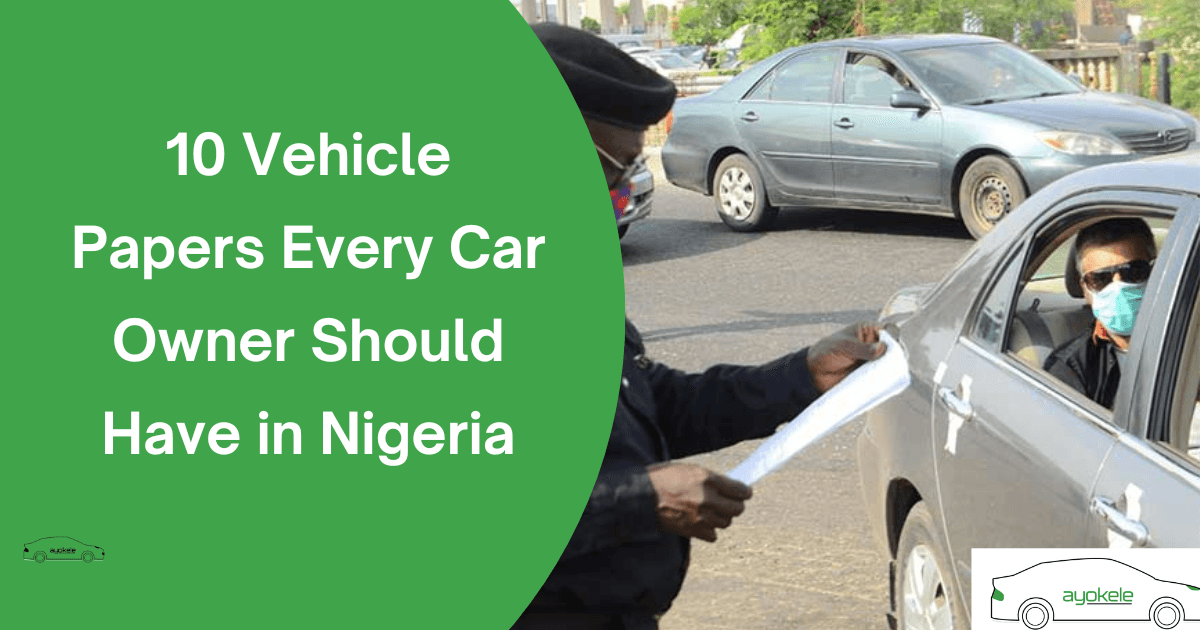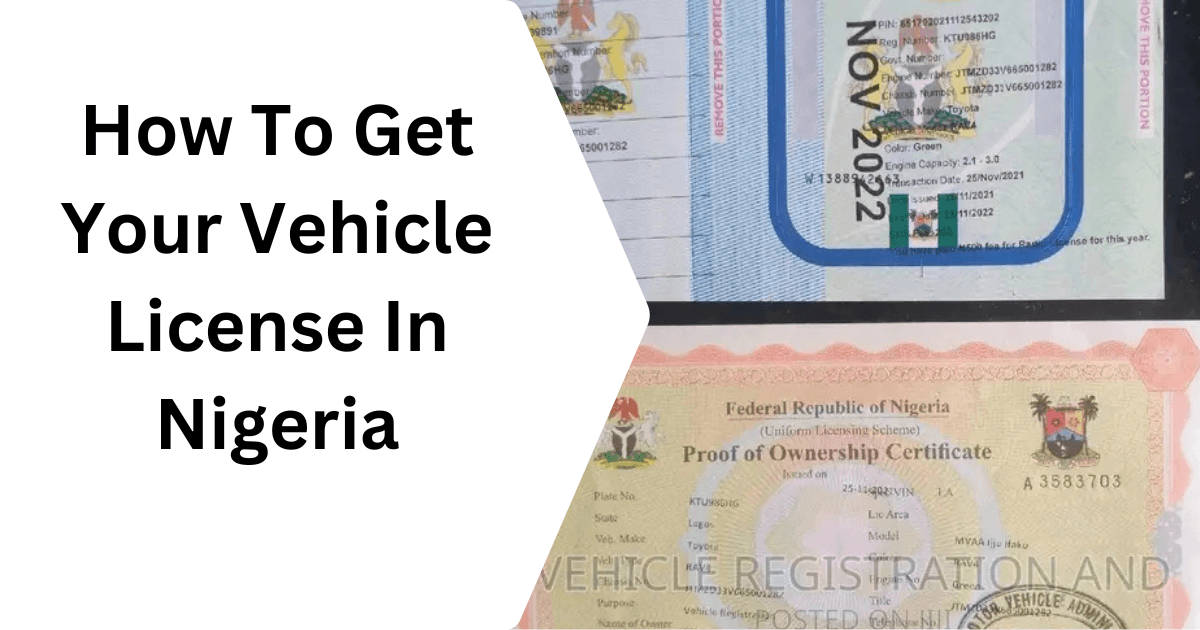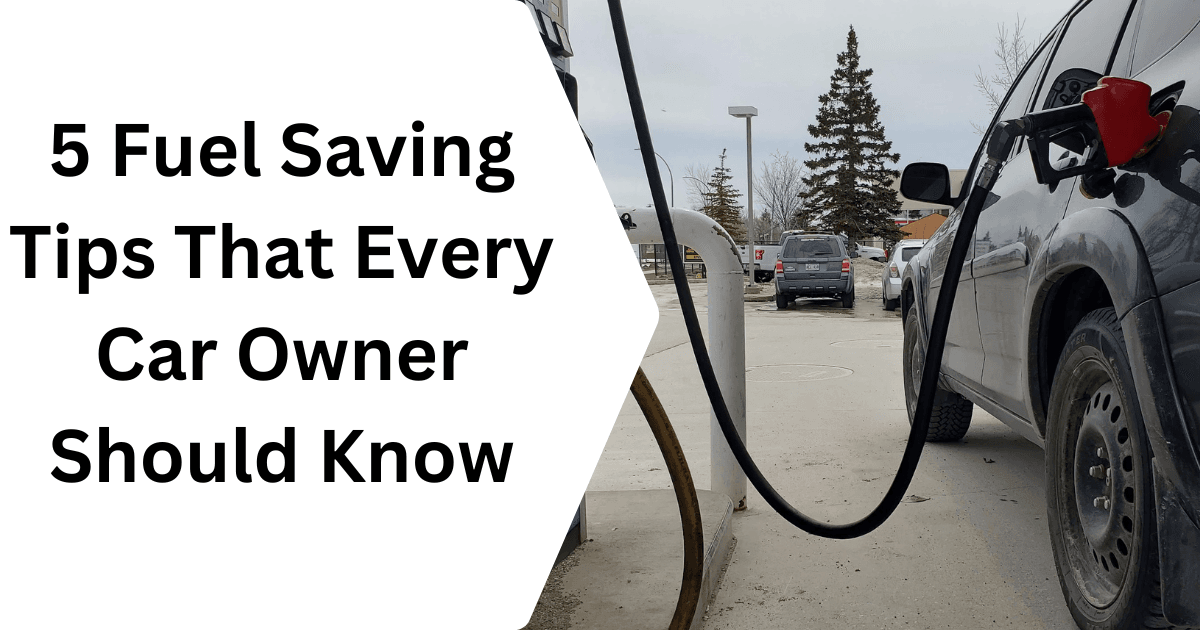Owning a car in Nigeria comes with the responsibility of ensuring you have all the necessary vehicle papers. These documents not only prove the legality of your ownership but also ensure compliance with road safety regulations. Without them, you risk fines, penalties, or even having your vehicle impounded during routine inspections.
This guide highlights the 10 essential vehicle papers every car owner in Nigeria must have. By keeping these documents up to date and readily available, you can enjoy hassle-free driving and avoid unnecessary legal complications.
1. Vehicle Registration Certificate
The vehicle registration certificate is proof that your car has been registered with the appropriate authorities in Nigeria, making it legal to drive on public roads. This document includes essential details such as the vehicle’s make, model, and registration number. It also serves as a form of identification for your car during routine inspections or if there’s a need to verify ownership.
Failure to carry a valid registration certificate can result in fines or your vehicle being impounded. Ensure this document is updated annually and reflects the current status of your vehicle. If you’ve recently moved or made modifications to your car, notify the registration office to update the details accordingly.
2. Proof of Ownership
The proof of ownership document establishes that you are the legal owner of your vehicle. This is particularly important during inspections, resale transactions, or disputes regarding ownership. It typically includes your name, the vehicle’s details, and the issuing authority’s stamp.
Without a proof of ownership document, you may face challenges in proving the vehicle is yours, especially during law enforcement checks. Keep this document in a safe place and carry a certified copy in your car for verification purposes when needed.
3. Roadworthiness Certificate
The roadworthiness certificate confirms that your vehicle is safe to drive on the road. This document is issued after your car passes a thorough inspection to ensure the brakes, tires, lights, and engine meet safety standards. It is mandatory for all vehicles, particularly those used for commercial purposes.
Roadworthiness certificates usually have a validity period, often six months to a year, depending on the type of vehicle. Failing to renew this document on time can result in fines or being denied access to public roads. Regular maintenance and timely renewals will ensure your car remains compliant.
4. Insurance Certificate
An insurance certificate is a legal requirement for all vehicle owners in Nigeria. At a minimum, third-party insurance is mandatory, covering damages caused to other vehicles, property, or individuals in the event of an accident. Comprehensive insurance offers additional coverage, including protection for your own vehicle.
Driving without valid insurance can lead to severe penalties or criminal charges. Always ensure your insurance certificate is up-to-date and meets the coverage requirements for your needs. Carry both physical and digital copies for convenience during inspections or emergencies.
5. Driver’s License
A valid driver’s license is essential for legally operating a vehicle in Nigeria. This document certifies that you have been tested and deemed capable of driving safely. Your driver’s license must match the type of vehicle you operate, such as a commercial or private license.
Expired or invalid licenses can result in hefty fines or license suspension. Renew your driver’s license before its expiration date and ensure it is always in your car when driving. Additionally, familiarize yourself with the process for replacing a lost or stolen license to avoid complications.
6. Vehicle License
The vehicle license is proof that your car is authorized to be on Nigerian roads. It is issued by the Federal Road Safety Corps (FRSC) and must be renewed annually. The license also includes details such as the vehicle’s registration number and expiry date.
Not having a valid vehicle license can result in fines or your vehicle being seized. Renew your license promptly and display the physical document on your windshield for easy verification by law enforcement officers.
7. Hackney Permit (for Commercial Vehicles)
A Hackney permit is required for commercial vehicles operating in Nigeria. This document authorizes vehicles like taxis, buses, or trucks to transport passengers or goods. Without it, commercial vehicles may be fined or restricted from operating.
To obtain a Hackney permit, you’ll need proof of vehicle registration, roadworthiness, and other supporting documents. Renewing this permit on time ensures uninterrupted business operations and compliance with the law.
8. Certificate of Incorporation (for Company-Owned Cars)
For cars owned by companies or organizations, a certificate of incorporation is often required during registration. This document ties the vehicle to the registered company and is used for taxation and identification purposes.
If your company owns a fleet of cars, ensure all vehicles have their documents aligned with the organization’s Certificate of Incorporation. Keep copies readily available, as they may be requested during audits or legal checks.
9. Emission Test Certificate
The emission test certificate ensures your car meets environmental standards for emissions. This document is especially important in areas where air quality is closely monitored. Regular testing ensures your car’s exhaust system is functioning correctly and does not emit harmful gases.
Vehicles with excessive emissions may be fined or restricted from certain areas. Periodic testing and obtaining the necessary certificate help maintain compliance and reduce environmental harm.
10. Purchase Receipt or Invoice
The purchase receipt or invoice is proof of the transaction when you acquire a vehicle. It serves as a record of the seller, buyer, price, and date of purchase. This document is critical for legal purposes and during disputes over ownership.
Keep the original purchase receipt in a safe place and carry a copy when driving. It can be useful during inspections, resale, or when transferring ownership of the vehicle.
FAQs
1. What happens if I’m caught without my vehicle papers?
Driving without the required vehicle papers can result in fines, penalties, or even the impounding of your car by law enforcement. It’s important to always carry valid documents when driving.
2. How often do I need to renew my vehicle license?
In Nigeria, vehicle licenses are typically renewed annually. Ensure you renew yours before it expires to avoid fines or legal issues during road checks.
3. Is third-party insurance mandatory in Nigeria?
Yes, third-party insurance is the minimum legal requirement for all vehicles in Nigeria. It covers damages to other people’s property or injuries caused by your vehicle.
4. What is the difference between a vehicle license and a roadworthiness certificate?
A vehicle license permits your car to be on the road legally, while a roadworthiness certificate confirms that your vehicle is safe for driving after a technical inspection. Both are mandatory.
5. Can I renew my vehicle documents online?
Yes, several vehicle documents, such as insurance and vehicle licenses, can be renewed online through platforms like the FRSC or authorized service providers. However, some documents, like a roadworthiness certificate, may require a physical inspection.
6. What should I do if I lose my proof of ownership?
If you lose your proof of ownership, visit the authority where it was issued, such as the Motor Licensing Office, and request a replacement. You may need to provide supporting documents and pay a fee.
Having the right vehicle papers is essential for every car owner in Nigeria. These documents not only ensure compliance with the law but also protect you during inspections and transactions. Keeping your papers updated and readily available helps you avoid fines, delays, and unnecessary legal complications.




